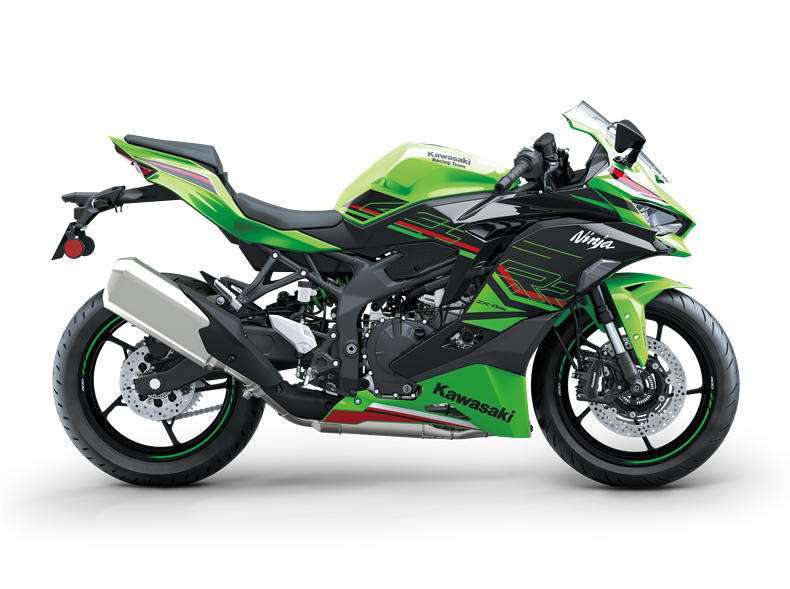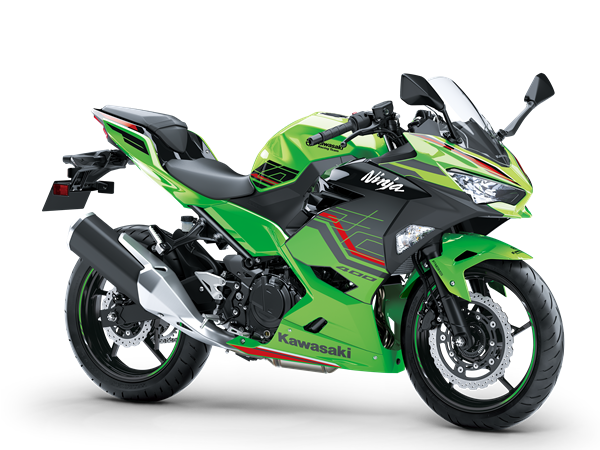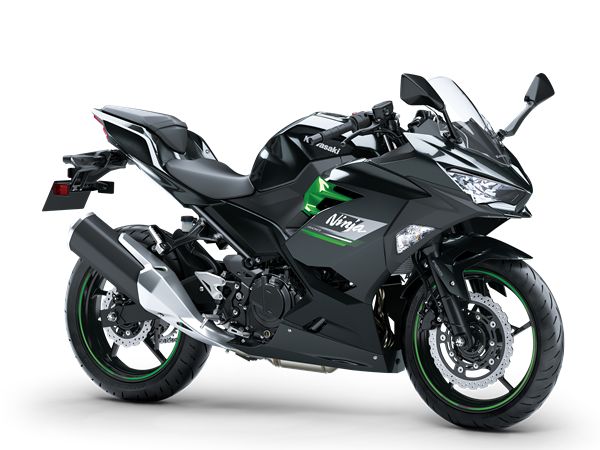Call Us

Clad in sharp Ninja styling, the Ninja 400 delivers greater performance than its predecessor care of all-new engine and chassis that are more powerful and significantly lighter. But like the Ninja 300 that preceded it, this Ninja model possesses much more than high performance. Not only does the Ninja 400 offer stunning, high-quality looks, its stronger engine performance, light, predictable handling and relaxed, sporty riding position make it both fun and easy to ride.
In addition to contributing to the Ninja 400’s sharper looks, slim LED headlamps (each featuring low and high beams, as well as a LED position lamp) are highly visible and offer significantly increased brightness.
Relaxed rider triangle accommodates a wide range of rider sizes and riding situations. Compared to some other models (whose somewhat extreme riding position compromises comfort), the elevated handle position and slightly foot-forward footpeg position put the rider in a position to control the bike while also offering rider comfort.
The Ninja 400’s 399 cm3 engine delivers a balance of performance and controllability. The engine offers increased performance at all rpm compared to its predecessor, with good power feeling. Smooth, predictable response contributes to an easy-to-control engine character. Thanks to its efficient design, the compact, lightweight engine has a size on par with 250cc engines.
While seat height is 785 mm, the slim design of both the seat and the rear of the engine gives riders an unobstructed line for their feet to reach the ground.
Head-turning looks have always been a forte of Ninja models, regardless of displacement. The new Ninja 400 boasts futuristic new Ninja styling inspired by the mighty Ninja H2. The largevolume bodywork attracts attention, and gives the impression of a larger machine. This impression is reinforced by the high-class design and superb fit and finish, which are comparable to bikes from a larger-displacement class.
The Ninja 400 is equipped with a sophisticated cockpit, featuring a large analogue tachometer flanked by warning lamps on one side, and a gear position indicator and multi-function LCD screen on the other.
The Ninja 400 features a trellis frame similar in design to that of the Ninja H2. Kawasaki’s advanced dynamic rigidity analysis was used to ensure optimum rigidity with light weight. The engine is rigidmounted and used as a stressed member. The frame design contributes significantly to the bike’s low curb mass.
Measuring ø310 mm (the same disc size used on the Ninja ZZR1400), the Ninja 400's semifloating front disc offers sure stopping power. A rigid new front brake master cylinder helps eliminate ineffective (idle) stroke, contributing to controllability, while carefully selected brake hose dimensions and material contribute to brake touch. Featuring the latest ABS unit from Nissin, the most compact and lightweight available.
ERGO-FIT is an interface system that allows a wide range of riders to feel at one with their machine. Genuine Kawasaki Accessories may need to be purchased for certain Ergo Fit adjustments.
ABS (Anti-lock Brake System) ensures stable braking performance by preventing wheel lock during braking.
Based on racing technology, the Assist & Slipper Clutch acts as both a back-torque limiter and a self-servo mechanism that enables a lighter clutch lever pull.
The Economical Riding Indicator is a mark appearing on the instrument panel to indicate favourable fuel consumption, encouraging fuel efficient riding.


 Engine
Engine| Engine Type | Liquid-cooled, 4-stroke Parallel Twin |
|---|---|
| Displacement | 399 cm³ |
| Bore x stroke | 70 x 51.8 mm |
| Compression ratio | 11.5:1 |
| Valve system | Valve system |
| Fuel system | Fuel injection: Ø 32 mm x 2 |
| Starting System | Electric |
| Lubrication | Forced lubrication, wet sump |
 Brakes & Suspension
Brakes & Suspension| Brakes, front | Single semi-floating 310 mm petal discs. Caliper: Single balanced actuation dual piston |
|---|---|
| Brakes, rear | Single 220 mm petal disc. Caliper: Dual-piston |
| Suspension, front | 41mm telescopic fork |
| Suspension, rear | Bottom-Link Uni-Trak, gas-charged shock with adjustable preload |
 Performance & Transmission
Performance & Transmission| Maximum power | 33.4 kW {45 PS} / 10,000 rpm |
|---|---|
| CO2 Emission | 91 g/km |
| Maximum torque | 37 N•m {3.8 kgf•m} / 8,000 rpm |
| Transmission | 6-speed |
| Final drive | Sealed chain |
| Primary Reduction Ratio | 2.219 (71/32) |
| Gear Ratios 1st | 2.929 (41/14) |
| Gear Ratios 2nd | 2.056 (37/18) |
| Gear Ratios 3rd | 1.619 (34/21) |
| Gear Ratios 4th | 1.333 (32/24) |
| Gear Ratios 5th | 1.154 (30/26) |
| Gear Ratios 6th | 1.037 (28/27) |
| Final reduction ratio | 2.929 (41/14) |
| Clutch | Wet multi-disc, manual |
 Frame & Dimensions
Frame & Dimensions| Frame type | Trellis, high-tensile steel |
|---|---|
| Trail | 92 mm |
| Wheel travel front | 120 mm |
| Wheel travel rear | 130 mm |
| Tyre, front | 110/70R17 M/C 54H |
| Tyre, rear | 150/60R17 M/C 66H |
| L x W x H | 1,990 x 710 x 1,120 mm |
| Wheelbase | 1,370 mm |
| Ground clearance | 140 mm |
| Fuel capacity | 14 litres |
| Seat height | 785 mm |
| Curb mass | 168 kg |